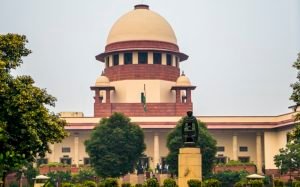The appellants are Saurabh Kumar Tripathi (brother-in-law) and Prateek Tripathi, Vivekanand Tiwari, and Mira Tiwari (husband, father-in-law, and mother-in-law respectively)1. The respondent is Vidhi Rawal, the aggrieved wife.
The Marriage & Complaint: Prateek Tripathi married Vidhi Rawal on 12th December 2019. Two years later, on 8th December 2021, Vidhi Rawal filed a complaint alleging that dowry was demanded and that the appellants subjected her to mental and physical harassment for non-payment of dowry, including demanding Rs. 20 Lakh cash and a top model SUV car.
Legal Action Taken: An FIR (No. 3 of 2022) was lodged under Sections 498A, 504, 506, and 34 of the Indian Penal Code1. Separately, the respondent also filed an application under Section 12 of the Protection of Women from Domestic Violence Act, 2005 (DV Act).
High Court’s Decision: The appellants filed petitions under Section 482 of the Criminal Procedure Code (CrPC) (or Section 528 of the Bharatiya Nagarik Suraksha Sanhita, 2023 – BNSS) to quash the DV Act proceedings. The High Court dismissed these quashing petitions, stating that proceedings under Section 12 of the DV Act are civil in nature and therefore cannot be quashed2. This appeal challenges that High Court order1.
Law Involved
Central Question: Whether the High Court can invoke its inherent jurisdiction under Section 482 of the CrPC (or Section 528 of the BNSS) to quash proceedings initiated under Section 12 of the DV Act, 20053.
The Protection of Women from Domestic Violence Act, 2005 (DV Act): This Act provides for various reliefs (protection orders, residence orders, monetary relief, custody orders, compensation orders) to victims of domestic violence. An application for these reliefs is made to a Magistrate under Section 129.
Criminal Procedure Code, 1973 (CrPC): Section 482 grants inherent powers to the High Court to make orders necessary to prevent abuse of process or to secure the ends of justice.
Bharatiya Nagarik Suraksha Sanhita, 2023 (BNSS): Section 528 is the equivalent provision to Section 482 CrPC.
Legal Nature of DV Act Proceedings: A key point of contention was whether DV Act proceedings are purely civil, criminal, or sui generis (of its own kind).
Jurisdiction of Magistrate: Under the DV Act, “Magistrate” refers to a Judicial Magistrate of the first class or a Metropolitan Magistrate, who exercise jurisdiction under the CrPC and are part of Criminal Courts.
Relevant Precedents: The Court considered earlier High Court decisions and its own precedent in Kunapareddy alias Nookala Shanka Balaji v. Kunapareddy Swarna Kumari and Another.
Reasoning
Purpose of DV Act: The DV Act was enacted to provide more effective protection to women against domestic violence, acknowledging it as a menace that affects women within the family.
Nature of DV Act Proceedings:
The Court acknowledged that the reliefs granted under the DV Act (Sections 18-23) are predominantly civil in nature.
However, the Magistrate who entertains applications under Section 12 of the DV Act is a Judicial Magistrate of the first class or a Metropolitan Magistrate, who is a Criminal Court under the CrPC.
The procedure for such applications is governed by the CrPC to a significant extent, as outlined in Section 28 of the DV Act.
Importantly, an application under Section 12 of the DV Act is not a “complaint” under Sections 200 to 204 of the CrPC, and it does not necessarily result in the cognizance of an offence.
Despite the civil nature of the reliefs, the Magistrate is a Criminal Court and proceedings thereunder are part of the criminal justice system in the broader sense, especially since violation of a protection order can lead to penal consequences.
High Court’s Power to Quash (Section 482 CrPC):
The Court held that the High Court’s inherent power under Section 482 CrPC (or Section 528 BNSS) can be exercised to quash DV Act proceedings.
The High Court’s reasoning that such proceedings, being civil in nature, cannot be quashed under Section 482 CrPC was deemed incorrect.
The purpose of Section 482 CrPC is to prevent abuse of the process of any Court and to secure the ends of justice. This power extends to quashing proceedings even if they are predominantly civil, as long as a criminal court or a Magistrate exercising powers under the CrPC is involved.
The Court clarified that its previous observations in Kunapareddy regarding the civil nature of DV Act proceedings should not be interpreted to curtail the High Court’s inherent quashing power under Section 482 CrPC.
- Caution in Exercise: While the power exists, the High Court must exercise caution and only interfere when there is clear illegality or a gross abuse of the process of law.
- Holding
- The Supreme Court allowed the Civil Appeals .
- The impugned order of the High Court of Madhya Pradesh dated 9th May 2024, which dismissed the petitions for challenging the proceedings emanating from Section 12(1) of the DV Act, 2005, was quashed.
- The Supreme Court explicitly held that the High Courts can exercise power under Section 482 of CrPC (or Section 528 of the BNSS) to quash proceedings emanating from an application under Section 12(1) of the DV Act, 2005.
- The cases are remitted back to the High Court for fresh consideration of the quashing petitions in light of the principles laid down in this judgment .
Shaurabh Kumar Tripathi V. Vidhi Rawal
Supreme Court: 2025 INSC 734: (DoJ 19-05-2025)






